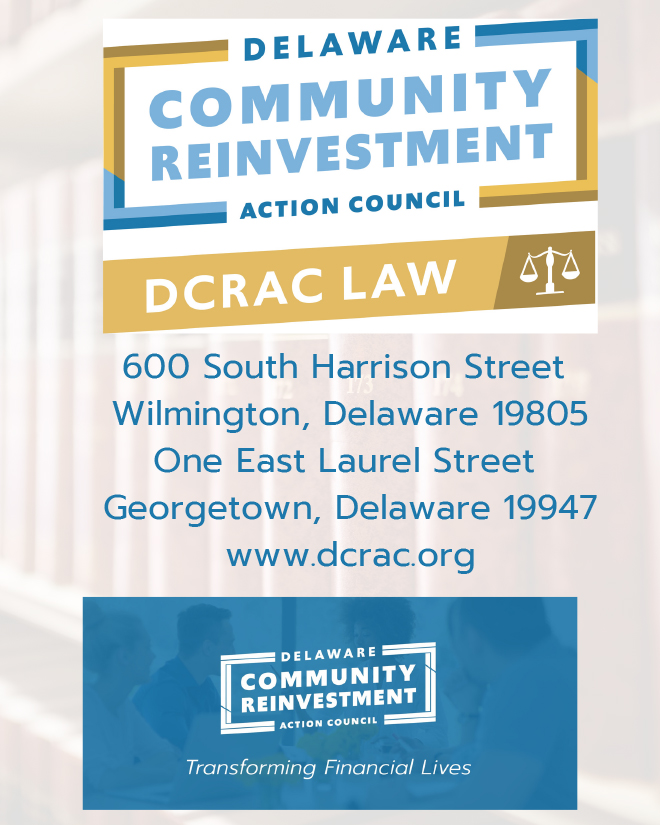A Great Time To Address Any Loose Ends

By Jaclyn Quinn, Esq.
Delaware Community Reinvestment Action Council, Inc.
Over the years, while working with clients during estate planning or discussing probate of a loved one, we’ve stumbled upon unfinished business countless times. In some instances, these issues became ten times more complex, because the responsible party was not around to handle the work anymore. I’ll share a few examples as cautionary tales. Please consider this a reminder to take steps to resolve any outstanding matters you may have.
1. Ensure property ownership is unquestionable
This may sound like a no brainer, but there are many circumstances that could lead to questionable ownership when it comes to real estate. Divorce is one recurring cause I see regularly. If you own real estate with an ex-spouse, I recommend you try to resolve this matter. Abide by orders of the court with respect to property settlement. If there is no court order but an agreement, it is important to follow through. Allowing this type of matter to linger could cause complications if one owner passes away.
Another issue affecting real estate ownership is heirs’ property. If you are in a position where you inherited property, but you are unsure if the legal documents accurately indicate you are the owner, I recommend you seek counsel to check on this status as soon as possible. Again, in this situation, if someone passes away without having completed the necessary steps, her heirs will have to tackle the matter with greater difficulty.
2. Get a handle on your assets—including those old accounts
We often find evidence of old bank accounts, bonds, or investment certificates while gathering documents for probate after someone passes away. Sometimes the paperwork leads to a dead end, and in some instances, it is not until after several hours and immense frustration that the accounts are identified and accessible. If you know of accounts you may have opened long ago, perhaps you made a deposit and decided to let the funds rest there—gather the information, assess whether the account still makes sense for you, and update beneficiary designations if possible. These steps will simplify the process should you need the account down the road, and will make handling the account by your executor much easier if necessary.
If you had a retirement account with a previous employer and you have been meaning to track it down, now is a great time to do so. It is in your best interest to locate your accounts and configure your finances in the most advantageous way for you. Also, search for your name through the office of Unclaimed Property. While heirs may be able to retrieve funds, it is far more efficient to claim what is rightfully yours now: https://unclaimedproperty.delaware.gov/.
3. Make sure your estate planning is in order
Lastly, we come back to estate planning. If you haven’t put together a thoughtful plan, I strongly recommend you make it a priority. I’ll share one example as to why this is so important:
Client, Mr. Law, promised his daughter who lived with him and took care of him for the last 10 years, that she will inherit his home. Unfortunately, he never got around to executing a will. When he passed away, the law of intestate succession dictated that the house passed to all three of his children as tenants in common, or one-third shares each. Because the siblings were unable to reach an agreement about keeping the property, and two of the three wanted to sell it for the highest bid, daughter was unable to keep the house as she had discussed with her dad.
The bottom line here is to take action while you can. If you have preferences about how your property will pass after you’re gone, now is the time to execute a will. If you are caring for a loved one, encourage them to do the same. It is far easier to plan now, than to untangle disagreements and complex property matters later.
If you need legal advice, Jaclyn Quinn is licensed to practice law in Delaware and she and her colleagues at the Delaware Community Reinvestment Action Council are available to assist. For more information, or to schedule a consultation, please call (302) 298-3251 or email Jaclyn at [email protected]. For more information, visit www.dcrac.org.
Bio
Jaclyn Quinn, Esq. joined the Delaware Community Reinvestment Action Council (DCRAC) in 2011, first as a volunteer, then as staff. In 2014 Jaclyn opened and grew her private practice until 2019, when DCRAC Law opened to the community. DCRAC Law is a nonprofit law firm providing tax, title, and other legal services to those unable to pay market rates.
Jaclyn graduated with a B.A. in Political Science from The College of New Jersey before moving to Delaware to pursue her J.D. at Widener University- Delaware Law School. She was admitted to the Delaware Bar in 2012, and is also barred in U.S. Tax Court and U.S. Immigration Court. She has volunteered with the Office of the Child Advocate, DVLS, and assists as pro bono counsel in a variety of cases. Jaclyn is a member of the Howard High School Academy of Finance Advisory Board.


